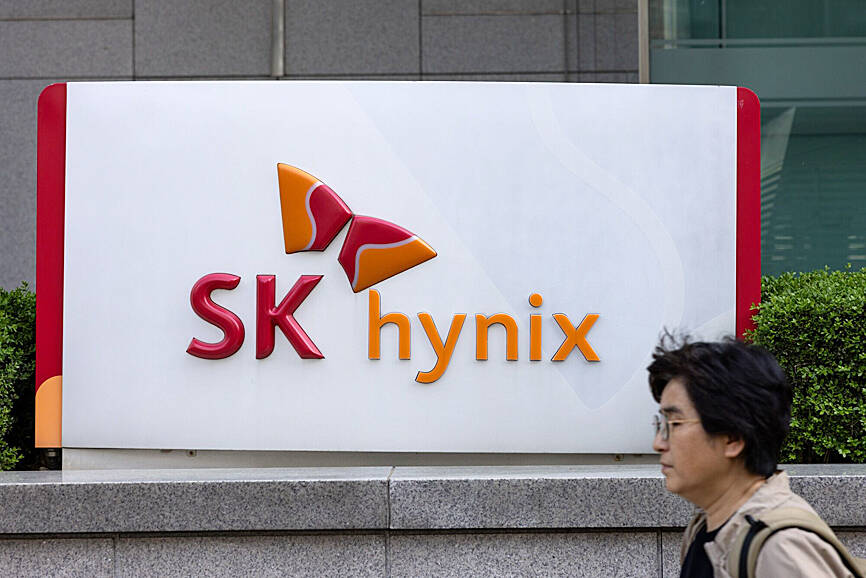The US Department of Commerce yesterday said it plans to award SK Hynix Inc up to US$450 million in grants to help fund an advanced packaging plant and research and development (R&D) facility for artificial intelligence (AI) products in Indiana.
In April, SK Hynix, the world’s second-largest memorychip maker, said it would invest about US$3.87 billion to build the facility in West Lafayette, Indiana.
The facility would include an advanced chip production line to mass-produce next-generation high-bandwidth memory chips, currently used in graphic processing units that train AI systems, the Nvidia Corp supplier said.

Photo: Bloomberg
The commerce department also plans to make available US$500 million in government loans for the SK Hynix project, which is expected to qualify for a 25 percent investment tax credit.
The memory packaging plant for AI products and an advanced packaging R&D facility would create 1,000 jobs and fill a key gap in the US semiconductor supply chain, the department said.
The US Congress in August 2022 approved a US$39 billion subsidy program for US semiconductor manufacturing and related components along with US$75 billion in government lending authority.
US Secretary of Commerce Gina Raimondo said that the department has announced term sheets with 15 companies offering about US$30 billion in funding that “will unlock another US$300 billion of private capital.”
The US has major commitments from all five major leading-edge semiconductor chip manufacturers — Taiwan Semiconductor Manufacturing Co (台積電), Intel Corp, Samsung Electronics Co, Micron Technology Inc and SK Hynix.
“It means we in the United States will have the most secure and diverse supply chain in the world for the advanced semiconductors that power artificial intelligence,” Raimondo told reporters.
No other economy in the world “has more than two of these companies producing leading-edge chips on its shores,” the department added.
SK Hynix CEO Kwak Noh-jung said in a statement that the company deeply appreciates “the US Department of Commerce’s support and is excited to collaborate in seeing this transformational project fully realized.”
The department in May said it planned to award US$75 million to Absolics Inc for constructing a facility in Georgia to supply advanced materials to the country’s semiconductor industry.
The planned award is to an affiliate of SKC Co, which in turn is part of South Korea’s second-largest conglomerate SK Group, as is SK Hynix.

GROWING OWINGS: While Luxembourg and China swapped the top three spots, the US continued to be the largest exposure for Taiwan for the 41st consecutive quarter The US remained the largest debtor nation to Taiwan’s banking sector for the 41st consecutive quarter at the end of September, after local banks’ exposure to the US market rose more than 2 percent from three months earlier, the central bank said. Exposure to the US increased to US$198.896 billion, up US$4.026 billion, or 2.07 percent, from US$194.87 billion in the previous quarter, data released by the central bank showed on Friday. Of the increase, about US$1.4 billion came from banks’ investments in securitized products and interbank loans in the US, while another US$2.6 billion stemmed from trust assets, including mutual funds,

Micron Memory Taiwan Co (台灣美光), a subsidiary of US memorychip maker Micron Technology Inc, has been granted a NT$4.7 billion (US$149.5 million) subsidy under the Ministry of Economic Affairs A+ Corporate Innovation and R&D Enhancement program, the ministry said yesterday. The US memorychip maker’s program aims to back the development of high-performance and high-bandwidth memory chips with a total budget of NT$11.75 billion, the ministry said. Aside from the government funding, Micron is to inject the remaining investment of NT$7.06 billion as the company applied to participate the government’s Global Innovation Partnership Program to deepen technology cooperation, a ministry official told the

Taiwan Semiconductor Manufacturing Co (TSMC, 台積電), the world’s leading advanced chipmaker, officially began volume production of its 2-nanometer chips in the fourth quarter of this year, according to a recent update on the company’s Web site. The low-key announcement confirms that TSMC, the go-to chipmaker for artificial intelligence (AI) hardware providers Nvidia Corp and iPhone maker Apple Inc, met its original roadmap for the next-generation technology. Production is currently centered at Fab 22 in Kaohsiung, utilizing the company’s first-generation nanosheet transistor technology. The new architecture achieves “full-node strides in performance and power consumption,” TSMC said. The company described the 2nm process as

JOINT EFFORTS: MediaTek would partner with Denso to develop custom chips to support the car-part specialist company’s driver-assist systems in an expanding market MediaTek Inc (聯發科), the world’s largest mobile phone chip designer, yesterday said it is working closely with Japan’s Denso Corp to build a custom automotive system-on-chip (SoC) solution tailored for advanced driver-assistance systems and cockpit systems, adding another customer to its new application-specific IC (ASIC) business. This effort merges Denso’s automotive-grade safety expertise and deep vehicle integration with MediaTek’s technologies cultivated through the development of Media- Tek’s Dimensity AX, leveraging efficient, high-performance SoCs and artificial intelligence (AI) capabilities to offer a scalable, production-ready platform for next-generation driver assistance, the company said in a statement yesterday. “Through this collaboration, we are bringing two